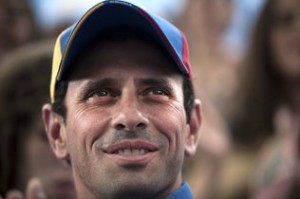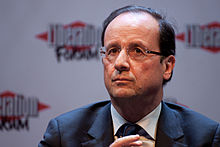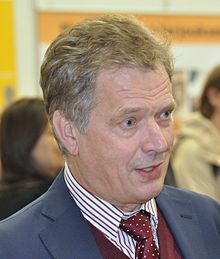News from France, Finland and Venezuela
Tuesday's World Events — Posted on March 6, 2012
FRANCE – French Front-Runner Pledges 75% Tax Bracket
PARIS | French presidential front-runner François Hollande said taxpayers earning over €1 million ($1.35 million) a year would be subjected to a special 75% tax bracket should he be elected, underscoring heightened interest across Europe in raising taxes on the wealthiest individuals.
Speaking on French television late Monday, the Socialist candidate lamented the “considerable increase” in French corporate executives’ pay, which he put at $2.7 million a year on average. “How can we accept that?” asked Mr. Hollande.
His proposal caused an uproar in the ruling UMP party, and surprised even Mr. Hollande’s own advisers. Jérôme Cahuzac, head of the National Assembly’s budget commission and a close ally of Mr. Hollande, appeared to learn of the candidate’s proposal during a live TV interview. “You’re questioning me about a proposal I haven’t heard of,” he told his interviewer.
President Nicolas Sarkozy pointed to the “appalling amateurism” of his opponent’s proposals.
But Mr. Hollande stuck to his proposal on Tuesday. “It’s a message of social cohesion….It’s a matter of patriotism,” he told journalists on his way in to Paris’s annual agriculture fair. …
Mr. Sarkozy’s government has already slapped a 3% temporary levy on high revenue to be applied to those with a taxable income exceeding $661,000 a year.
But Mr. Hollande’s proposal is more extreme and underscores his bid to draw in leftist voters ahead of the April 22 first round of the presidential poll.
Messrs. Hollande and Sarkozy are widely predicted to make it past the first round to compete in a run-off on May 6, where the Socialist has a convincing lead, according to opinion polls. But Mr. Sarkozy has regained some ground since officially declaring his candidacy on Feb. 15 and hitting the campaign trail.
Mr. Hollande has already vowed to introduce a new, higher rate of income tax for those earning over $198,000 a year, who would face a marginal rate of 45%, rather than 41% now; pledged to cut taxes on profit for small and midsize companies, and scrap $38.3 billion of tax breaks introduced by Mr. Sarkozy. Mr. Hollande’s proposal to set the marginal tax rate at 75% would apply only to income above $1.3 million.
FINLAND – Finland’s new conservative president sworn in
HELSINKI | Sauli Niinisto was sworn in Thursday [March 1] as Finland’s president, becoming the first conservative head of state in the Nordic country in over half a century.
The 63-year-old Niinisto from the conservative National Coalition Party replaces Tarja Halonen, who had spent 12 years in office.
With right-leaning Prime Minister Jyrki Katainen leading the government, conservatives now control the Finland’s top two posts.
A former finance and justice minister, Niinisto took his oath in the 200-seat Parliament. In his speech to lawmakers, he said he was worried over Finland’s financial welfare and the government’s increasing tendency to borrow money, issues he described as “warning signals” for the nation’s economy.
A lawyer by profession, Niinisto was finance minister in 2002 when Finland adopted the euro. [NOTE: The euro is the official currency of the eurozone, which includes 17 of the 27 member states of the European Union. The eurozone consists of Austria, Belgium, Cyprus, Estonia, Finland, France, Germany, Greece, Ireland, Italy, Luxembourg, Malta, the Netherlands, Portugal, Slovakia, Slovenia, and Spain. The currency is also used in a further five European countries and consequently used daily by some 332 million Europeans. Additionally, over 175 million people worldwide – including 150 million people in Africa – use currencies which are pegged to the euro.]
Finland has been a vocal supporter of a hard-line stance against profligate eurozone member countries such as Greece and Italy — a position that finds wide support among the country’s 5.3 million people.
Though the presidency is largely a ceremonial role not involved in daily politics, Niinisto said the head of state can act as “an agent of the economy and agent of integrity.”
He pledged to keep up with Finland’s reputation for “responsibility and solidarity” within the European Union [EU], while actively seeking to strengthen ties with the United States and China.
Under Finland’s Constitution, the president takes the lead on non-EU [European Union] matters of foreign policy and acts as the supreme commander of the armed forces.
Niinisto will serve a six-year term.
VENEZUELA – Venezuelans choose Capriles to oppose Chávez

Henrique Capriles, 39, Venezuelan opposition candidate who will challenge President Hugo Chavez in October.
Venezuelans turned out in force [on Feb. 12] and chose Henrique Capriles Radonski by almost a 1-million vote margin as the opposition candidate to face President Hugo Chávez in October. … All the opposition candidates have pledged to back the winner, hoping a unified front will unseat Chávez in October.
Voting was strong in Venezuela’s first unified opposition primary, and organizers were forced to keep polls open an extra hour. The healthy turnout came after Chávez and other officials had taunted the opposition saying few would vote.
Organizers were hoping to see about 1.5 million to 2 million voters, of the 18 million registered, in Sunday’s race. [More than 2.9 million people actually voted. Capriles, the governor of Miranda state, garnered 1.8 million votes, or about 62 percent of the total.] …
While Capriles can count on a unified opposition vote, he will also have to peel away Chávez supporters who have grown weary of their leader, analysts said.
The Chávez administration has been plagued by problems — including rampant crime, high inflation and food shortages — but the president still commands fierce allegiance.
Analysts say about 30 percent of the population remains firmly pro-Chávez, or chavista, and the president’s popularity rating hovers around 50 percent.
As he crisscrossed the country on the campaign trail, Capriles preached a Brazilian-style mix of policies that aim to boost the private sector even as his government provides a safety net for the poor.
Addressing both sides of the economic spectrum will be key in building a Venezuela that “belongs to everybody,” he said.
………….
Sunday’s election was a landmark in Venezuela because it was the fist time that opposition parties have been able to put aside their differences and choose a single candidate. In the past, their divided vote played into Chávez’s hands. Along with presidential candidates, the opposition parties also chose 17 unity candidates for governor and 249 for mayor.
But Sunday’s strong turnout does little to predict what will happen in October, wrote Daniel Kerner, an analyst for the Eurasia Group Latin America. “This does not necessarily reflect broader support for Capriles, or his ability to garner support among independent voters,” he wrote. A key factor will be Chávez’s popularity ratings going into the election, he said. “The presidential elections will be a referendum on Chávez more than anything else.”
…………..
(The news briefs above are from wire reports and staff reports posted at WSJ.com on February 29, STLToday.com on March 1 and MiamiHerald.com on Feb. 12th.)
Questions
1. For each of the 3 countries, give the following information:
a) location/the countries that share its borders
b) the religious breakdown of the population
c) the type of government
d) the chief of state (and head of government if different) [If monarch or dictator, since what date has he/she ruled? - include name of heir apparent for monarch]
e) the population
[Find the answers at the CIA World FactBook website. For each country, answers can be found under the "Geography" "People" and "Government" headings. Go to worldatlas.com for a list of continents.]
NOTE: Before answering the questions below, read the info under "Background" and watch the videos under "Resources."
2. For FRANCE:
a) list the who, what, where and when of the news item
b) In addition to the 75% tax rate, what changes has Mr. Hollande said he would make if elected president?
3. For FINLAND:
a) list the who, what, where and when of the news item
b) The prime minister runs the government in Finland; the president's role is mostly ceremonial. What areas of the government is he responsible for?
4. For VENEZUELA:
a) list the who, what, where and when of the news item
b) What was significant about Mr. Capriles' win?
Background
FRANCE:
- François Hollande is trying to get the French Left back in power 23 years after it last won an election.
- Despite a 30-year career as a professional politician, Mr. Hollande has never held a position in government.
- He won the Socialist Party and Left Radical Party nomination in a two-round primary election. His political political base is in Correze, a farming region in France's geographical center.
- Mr. Hollande, 57 years old, promised to reverse the legacy of Mr. Sarkozy by raising taxes for corporations, banks and the wealthy, creating 60,000 teacher jobs and 150,000 subsidized jobs in areas of high unemployment.
- Mr. Hollande's partner for over 30 years, Ségolène Royal, ran for president against Mr. Sarkozy in 2007. They are separated. (from the WSJ article)
------------------------------------
FINLAND:
Sauli Niinisto is married and has two adult sons from a previous marriage. His first wife died in a car accident. Niinisto and his sons were among the survivors of the 2004 tsunami while vacationing in Thailand. He escaped the ensuing tsunami by climbing up a utility pole with his son Matias in Khao Lak.
-------------------------------------
VENEZUELA:
For most of the first half of the 20th century, Venezuela was ruled by generally benevolent military strongmen, who promoted the oil industry and allowed for some social reforms. Democratically elected governments have [ruled] since 1959. Hugo Chavez, president since 1999, has promoted a controversial policy of "democratic socialism," which [aims] to alleviate social ills while at the same time attacking globalization and undermining regional stability. (From the CIA World FactBook.)
Under the presidency of Hugo Chávez Venezuela has seen sweeping and radical shifts in social policy, moving away from the government officially embracing a free market economy and towards quasi-socialist income redistribution and social welfare programs. (from wikipedia)
From a Reuters "Factbox" on Henrique Capriles' views on Foreign Relations:
- Capriles has pledged to prioritize relationships with countries in the Americas and "democratic" nations, as opposed to Chavez's ties with politically-allied governments often far away and with questionable rights records such as Iran or Belarus.
- Despite that, China will remain an essential partner of Venezuela, he vowed. "No one in the world can do without China."
- Capriles sees no need to cut relations with Cuba, where the Chavez government has had a particularly close relationship with the communist government, but ties must be put on a transparent footing. He has implied that the thousands of Cubans in Venezuela - from shantytown doctors to intelligence and security advisers - should be replaced by Venezuelans, and said the country should revise its agreement to supply oil to Cuba on preferential terms. "We will not give away oil to anyone, but neither will we stop selling to anyone."


